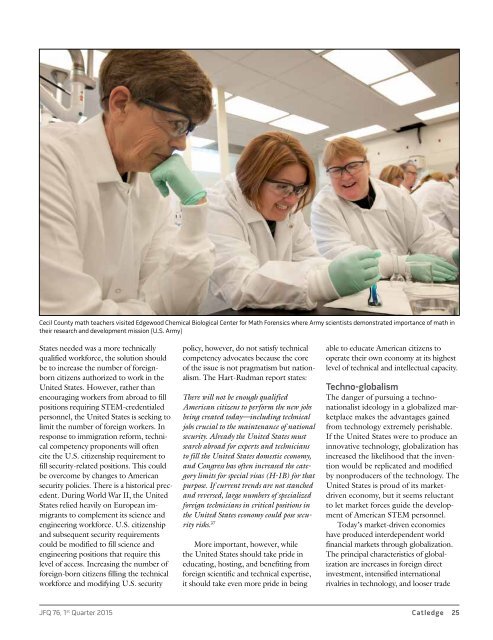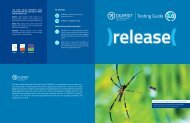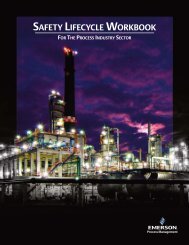jfq-76
jfq-76
jfq-76
Create successful ePaper yourself
Turn your PDF publications into a flip-book with our unique Google optimized e-Paper software.
Cecil County math teachers visited Edgewood Chemical Biological Center for Math Forensics where Army scientists demonstrated importance of math in<br />
their research and development mission (U.S. Army)<br />
States needed was a more technically<br />
qualified workforce, the solution should<br />
be to increase the number of foreignborn<br />
citizens authorized to work in the<br />
United States. However, rather than<br />
encouraging workers from abroad to fill<br />
positions requiring STEM-credentialed<br />
personnel, the United States is seeking to<br />
limit the number of foreign workers. In<br />
response to immigration reform, technical<br />
competency proponents will often<br />
cite the U.S. citizenship requirement to<br />
fill security-related positions. This could<br />
be overcome by changes to American<br />
security policies. There is a historical precedent.<br />
During World War II, the United<br />
States relied heavily on European immigrants<br />
to complement its science and<br />
engineering workforce. U.S. citizenship<br />
and subsequent security requirements<br />
could be modified to fill science and<br />
engineering positions that require this<br />
level of access. Increasing the number of<br />
foreign-born citizens filling the technical<br />
workforce and modifying U.S. security<br />
policy, however, do not satisfy technical<br />
competency advocates because the core<br />
of the issue is not pragmatism but nationalism.<br />
The Hart-Rudman report states:<br />
There will not be enough qualified<br />
American citizens to perform the new jobs<br />
being created today—including technical<br />
jobs crucial to the maintenance of national<br />
security. Already the United States must<br />
search abroad for experts and technicians<br />
to fill the United States domestic economy,<br />
and Congress has often increased the category<br />
limits for special visas (H-1B) for that<br />
purpose. If current trends are not stanched<br />
and reversed, large numbers of specialized<br />
foreign technicians in critical positions in<br />
the United States economy could pose security<br />
risks. 37<br />
More important, however, while<br />
the United States should take pride in<br />
educating, hosting, and benefiting from<br />
foreign scientific and technical expertise,<br />
it should take even more pride in being<br />
able to educate American citizens to<br />
operate their own economy at its highest<br />
level of technical and intellectual capacity.<br />
Techno-globalism<br />
The danger of pursuing a technonationalist<br />
ideology in a globalized marketplace<br />
makes the advantages gained<br />
from technology extremely perishable.<br />
If the United States were to produce an<br />
innovative technology, globalization has<br />
increased the likelihood that the invention<br />
would be replicated and modified<br />
by nonproducers of the technology. The<br />
United States is proud of its marketdriven<br />
economy, but it seems reluctant<br />
to let market forces guide the development<br />
of American STEM personnel.<br />
Today’s market-driven economies<br />
have produced interdependent world<br />
financial markets through globalization.<br />
The principal characteristics of globalization<br />
are increases in foreign direct<br />
investment, intensified international<br />
rivalries in technology, and looser trade<br />
JFQ <strong>76</strong>, 1 st Quarter 2015 Catledge 25




